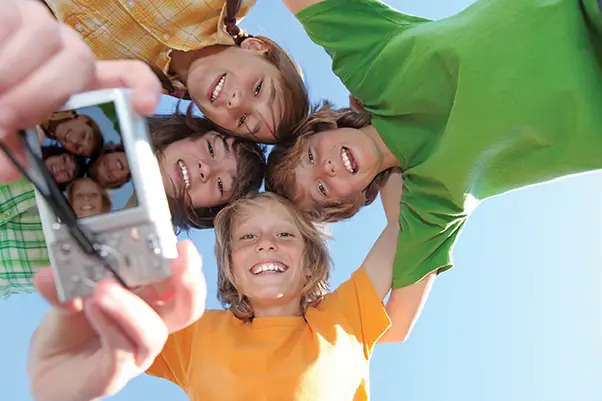Even though you can find after-school activities for any interest your child may have, summer camp is still an important experience for your child, from making new friends to getting prepared for college.
Research shows that in addition to making kids into confident, independent, well-adjusted individuals, camp can improve your children’s chances of getting into college, scoring a better job, and mastering vital leadership skills. So consider trading calculus for a kayak—ditch summer school and send your kids into the woods instead.
In his book, Homesick and Happy: How Time Away from Parents Can Help a Child Grow (Ballantine Books), psychologist and author Michael Thompson, Ph.D., demonstrates how the camp experience is not only still relevant, but it’s more necessary than ever.
Why do you consider summer camps to be “a magical experience”?
Camp is a great American invention, originally a way for inner city kids to get out of the city and into the country. Being away from your parents, living in the wilderness, learning new rituals, getting strong and tanned, and learning to swim and hike, experiencing nature…children have psychological control over the experience. What makes it so exciting is that you’re doing it on your own, making friends with kids whose parents Mom and Dad don’t even know! Taking part in the traditions of chanting, singing, and clapping—an oral history that is handed down from child to child. There’s no parent telling you from the sideline what a great job you’re doing. Kids take ownership of the whole experience, and this shapes their identity and their character.
What advice can you give to parents who are nervous about sending their child to summer camp for the first time?
I would ask them to consider: What is the sweetest moment of your childhood? When I posed this question during my research, more than 80 percent of adults chose an experience when they were away from a parent, with a peer—and possibly doing something that would make a parent very nervous! Of course it’s a difficult message to say to parents that you can’t keep your child perfectly safe. Life is fragile, and we don’t know where life is going to be most fragile. But camp is not the most fragile part of a child’s life.

How do you recommend parents appraise a summer camp?
Parents should take a long, hard look at the camp director, whose job it is to select the camp counselors, those 19- to 21-year-olds in whose direct charge your child will be. Camp directors have to choose these people very carefully, and they are usually former campers. In some instances, the counselor can be someone the director has been watching since that individual was the age of 9—somebody who has shown himself or herself to be compassionate and responsible, with leadership skills.
Why is the role of the camp counselor so important?
Age cohorts are so separate these days, so it’s very inspiring for the youngsters to be surrounded by smarter, cooler older kids. In school, the leaders are people much older than the kids, people the same age as most kids’ parents. The adult experience doesn’t seem very psychologically available to kids. But a 19-year-old counselor…that’s someone who is within striking distance of a tween. And these counselors are not just their caregivers but their developmental road map to the future.
What is the perfect age for a child to start attending summer camp?
It really depends on the readiness of the child. Has he or she expressed a desire to go to camp? Is he or she good at doing sleepovers? Has your child spent a few nights with Grandpa or with an aunt and uncle? I’ve seen boys as young as 7 go to eight-week sleepaway camp, and I’ve seen 14-year-old girls who still aren’t ready. The trick is, you do it because you want to do it. You repay your own investment. But the best practice for camp is sleepovers. And the best practice for college is camp.
How exactly does camp prepare children for college?
Would you send your 18-year-old son off to college if he had never left home for a single night? College admissions staff look [favorably] at people who have been to camp because taking care of younger children is the single most significant thing that an older child can do to prepare for leadership. For example, if you’re on waterfront staff—canoes, boating, swimming—you’re in charge of the lives of other kids. High school doesn’t give you anything like that kind of responsibility.
One of the simple joys of camp is the ban on cellphones, personal music players, and other electronics. But you note with dismay that many camps are now “breaking down” and allowing electronics. Is it possible that these camps are just adapting to today’s reality?
None of us thinks we can live without electronics. We’re all completely hooked. So it’s useful for kids to see and know that we can survive without electronics. If you want to see 250 boys doing recreational reading, camp is the place to see that.
Why did you write this book?
Parents kept asking me how they could do a better job, how they could do more for their child. Well, do less, I told them! Overall, we need less parental presence. This ‘over-parenting’ is just making our kids soft. So my book is a gentle way to remind parents that it is good for kids to spend time away from their parents. It’s my way of saying “back off!” I’m reminding parents that they had fun when they were independent little kids.




















